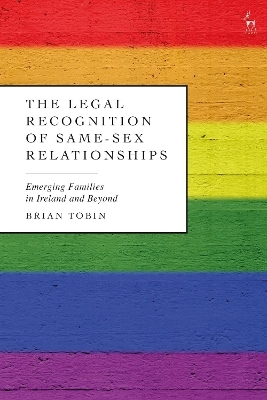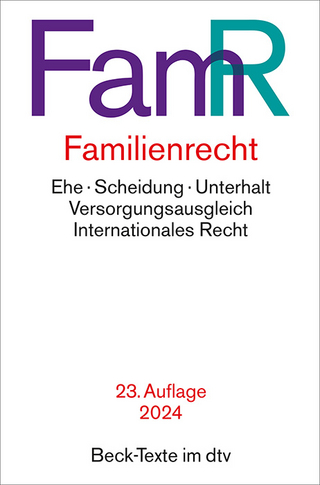
The Legal Recognition of Same-Sex Relationships
Hart Publishing (Verlag)
978-1-5099-5257-1 (ISBN)
It critically examines the Irish and Australian citizen-led approaches to achieving marriage equality, which made Ireland and Australia the first and second countries in the world, respectively, to extend the institution of marriage to same-sex couples on foot of a popular vote.
It analyses the pragmatic and symbolic effects of civil partnership, which was the premier means of formalising same-sex unions in Ireland. Ireland’s hurried ‘divorce’ from civil partnership in the aftermath of marriage equality is examined in light of evidence from the U.K. indicating that this mode of relationship recognition remains popular with both same-sex and opposite-sex couples in that jurisdiction.
The book goes on to consider the legal position of same-sex couples who are parenting children born via assisted reproductive techniques (ARTs) like donor-assisted human reproduction (DAHR) and surrogacy.
Finally, it looks at the impact (or lack thereof) of the European Convention on Human Rights (ECHR) as regards the protection of same-sex relationships, marriage and parental rights for same-sex couples. It does this to determine what is required of Ireland and other states party to the ECHR to comply with European human rights obligations when it comes to legally recognising couples, and parents, of the same sex.
Shortlisted for the 2024 SLS Margaret Brazier Prize for Outstanding Mid-Career Scholarship.
Brian Tobin is Associate Professor in Law at the University of Galway, the Republic of Ireland.
Foreword by Gerard Hogan
1. Introduction
2. Marriage Equality by Popular Vote: The Irish and Australian Experiences
I. Introduction
II. The Contours of the Constitutional Family Prior to Marriage Equality in Ireland
III. The Legislative Prohibition on Same-Sex Marriage
IV. The Legislative History of the Civil Registration Act 2004, s 2(2)
V. Same-Sex Marriage in the Irish Courts: Zappone v Revenue Commissioners
VI. Legal Recognition of Same-Sex Relationships Post-Zappone
VII. Would the Supreme Court have Declared Same-Sex Marriage Legislation Unconstitutional?
VIII. Constitutional Convention
IX. Marriage Referendum
X. Marriage Equality in Australia
XI. Plebiscites, Referenda, Political Opportunism and Human Rights Issues
XII. The Potential Pitfalls Associated with Australia’s Postal Plebiscite and Ireland’s Marriage Referendum
XIII. An Australian Referendum on Marriage Equality?
XIV. Conclusion
3. Same-Sex Relationships Beyond Marriage: Civil Partnership and Cohabitation in Ireland
I. Introduction
II. The Constitution and Non-Marital Unions
III. The Disparate Legislative Treatment of Non-Marital Couples in Ireland pre-2010
IV. Progressing Towards Civil Partnership
V. An Overview of the Rights and Duties of Civil Partners
VI. Differences between Civil Partnership and Marriage
VII. The Recognition of Foreign Civil Partnerships and Same-Sex Marriages
VIII. The Dissolution of Foreign Civil Partnerships and Same-Sex Marriages
IX. Civil Partnership: Separate, but Equal?
X. Civil Partnership in Post-Marriage Equality Ireland
XI. The Regulation of Cohabitation in Ireland
XII. Cohabitation Law Reform in the UK
XIII. Qualified Cohabitants and the Relief Available in Ireland under the 2010 Act
XIV. Cohabitants’ Agreements
XV. Conclusion
4. Parental Rights for Same-Sex Parents of Surrogate-Born and Donor-Conceived Children: Forging a Legal Framework for Ireland
I. Introduction
II. Same-Sex Parenting and the Welfare of the Child
III. Parental Rights for Same-Sex Couples: The Children and Family Relationships Act 2015
IV. Towards Regulating Domestic Surrogacy Arrangements under Irish Law
V. A Critique of the Hybrid Model for Regulating Domestic Surrogacy in Part 7 of the Health (Assisted Human Reproduction) Bill 2022
VI. The Pre-Conception State Approval Model for Regulating Surrogacy
VII. The Child’s Right to Knowledge of Identity – A Comparison between the Post-Birth Parental Order and Pre-Conception State Approval Models
VIII. The UN Special Rapporteur’s Position on Surrogacy Arrangements
IX. Altruistic Surrogacy Arrangements in the UK and Ireland: In Principle and in Practice?
X. Proposals for Allocating Parentage via Pre-Conception Authorisation in the UK and Ireland
XI. The AHRRA – An Administrative Route to Legal Parentage
XII. The Verona Principles
XIII. International Surrogacy
XIV. Should Ireland Follow the Approach to Surrogacy Law Reform in the UK?
XV. Donor-Assisted Human Reproduction
XVI. Non-Clinical DAHR Procedures
XVII. Alternative Proposals for Regulating Non-Clinical DAHR
XVIII. Conclusion
5. Same-Sex Relationships, Marriage and Parental Rights under the ECHR
I. Introduction
II. The Margin of Appreciation
III. Article 8
IV. Article 14
V. Same-Sex Relationships and the ECtHR: Respect for Private and Family Life, but not yet Wedded Bliss
VI. Consensual Same-Sex Sexual Activity and Relationships as Private Life under Article 8
VII. Same-Sex Couples and Family Life under Article 8
VIII. The Evolution of the Right to Marry under Article 12
IX. Same-Sex Marriage and Article 12 of the ECHR – Schalk and Kopf v Austria
X. Second-Parent Adoption by a Same-Sex Partner and the ECHR
XI. Surrogacy and the ECHR
XII. Implications of ECtHR Case Law for Ireland’s Approach to Surrogacy
XIII. Conclusion
6. Concluding Remarks
| Erscheinungsdatum | 16.08.2024 |
|---|---|
| Verlagsort | Oxford |
| Sprache | englisch |
| Maße | 156 x 234 mm |
| Themenwelt | Recht / Steuern ► Allgemeines / Lexika |
| Recht / Steuern ► EU / Internationales Recht | |
| Recht / Steuern ► Privatrecht / Bürgerliches Recht ► Familienrecht | |
| Sozialwissenschaften ► Politik / Verwaltung | |
| ISBN-10 | 1-5099-5257-8 / 1509952578 |
| ISBN-13 | 978-1-5099-5257-1 / 9781509952571 |
| Zustand | Neuware |
| Haben Sie eine Frage zum Produkt? |
aus dem Bereich


